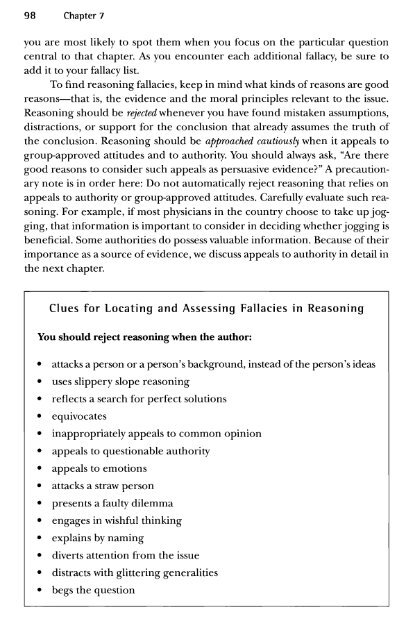Asking the Right Questions, A Guide to Critical Thinking, 8th Ed
Asking the Right Questions, A Guide to Critical Thinking, 8th Ed
Asking the Right Questions, A Guide to Critical Thinking, 8th Ed
Create successful ePaper yourself
Turn your PDF publications into a flip-book with our unique Google optimized e-Paper software.
98 Chapter 7<br />
you are most likely <strong>to</strong> spot <strong>the</strong>m when you focus on <strong>the</strong> particular question<br />
central <strong>to</strong> that chapter. As you encounter each additional fallacy, be sure <strong>to</strong><br />
add it <strong>to</strong> your fallacy list.<br />
To find reasoning fallacies, keep in mind what kinds of reasons are good<br />
reasons—that is, <strong>the</strong> evidence and <strong>the</strong> moral principles relevant <strong>to</strong> <strong>the</strong> issue.<br />
Reasoning should be rejected whenever you have found mistaken assumptions,<br />
distractions, or support for <strong>the</strong> conclusion that already assumes <strong>the</strong> truth of<br />
<strong>the</strong> conclusion. Reasoning should be approached cautiously when it appeals <strong>to</strong><br />
group-approved attitudes and <strong>to</strong> authority. You should always ask, "Are <strong>the</strong>re<br />
good reasons <strong>to</strong> consider such appeals as persuasive evidence?" A precautionary<br />
note is in order here: Do not au<strong>to</strong>matically reject reasoning that relies on<br />
appeals <strong>to</strong> authority or group-approved attitudes. Carefully evaluate such reasoning.<br />
For example, if most physicians in <strong>the</strong> country choose <strong>to</strong> take up jogging,<br />
that information is important <strong>to</strong> consider in deciding whe<strong>the</strong>r jogging is<br />
beneficial. Some authorities do possess valuable information. Because of <strong>the</strong>ir<br />
importance as a source of evidence, we discuss appeals <strong>to</strong> authority in detail in<br />
<strong>the</strong> next chapter.<br />
Clues for Locating and Assessing Fallacies in Reasoning<br />
You should reject reasoning when <strong>the</strong> author:<br />
• attacks a person or a person's background, instead of <strong>the</strong> person's ideas<br />
• uses slippery slope reasoning<br />
• reflects a search for perfect solutions<br />
• equivocates<br />
• inappropriately appeals <strong>to</strong> common opinion<br />
• appeals <strong>to</strong> questionable authority<br />
• appeals <strong>to</strong> emotions<br />
• attacks a straw person<br />
• presents a faulty dilemma<br />
• engages in wishful thinking<br />
• explains by naming<br />
• diverts attention from <strong>the</strong> issue<br />
• distracts with glittering generalities<br />
• begs <strong>the</strong> question



